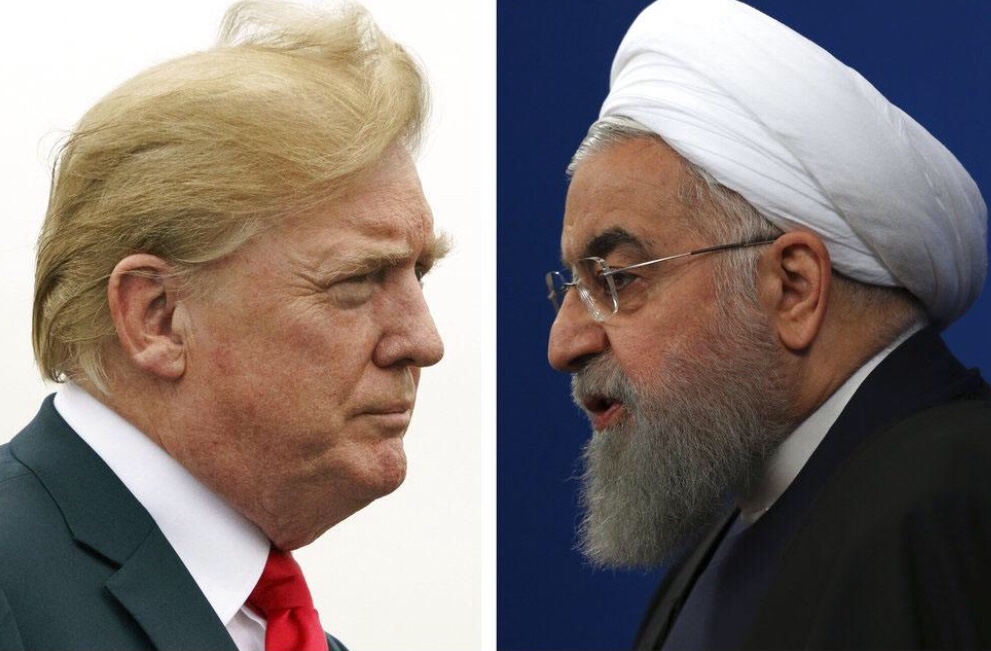 PHILIP A. DUR: We must be careful with Iran
PHILIP A. DUR: We must be careful with IranThis combination of two pictures shows U.S. President Donald Trump, left, on July 22 and Iranian President Hassan Rouhani on Feb. 6. In his latest salvo, Trump tweeted late on Sunday, July 22 that hostile threats from Iran could bring dire consequences. This was after Iranian President Rouhani remarked earlier in the day that ìAmerican must understand well that peace with Iran is the mother of all peace and war with Iran is the mother of all wars.î Trump tweeted: ìNEVER EVER THREATEN THE UNITED STATES AGAIN OR YOU WILL SUFFER CONSEQUENCES THE LIKE OF WHICH FEW THROUGHOUT HISTORY HAVE EVER SUFFERED BEFORE.î [ AP ]
By Philip A. Dur | Guest Columnist
Posted at 9:00 AM
The recent decision by the president to withdraw from the Joint Comprehensive Plan of Action (JCPOA), or the Iran Nuclear Deal, has rekindled debates about the merits of the agreement and the implications of our withdrawal for the future. To begin with, let’s posit here that the deal was imperfect in its content and unworkable as a check on Iran’s ambitions. Let us also note in passing that the agreement negotiated by Secretary of State John Kerry and “approved” by President Obama, was not binding on President Trump because it was never ratified by the Senate — as all real treaties must be pursuant to our Constitution. It was not submitted for ratification precisely because it certainly would have failed!
In the first place, the limits on Iran’s push to a nuclear capability to compliment its advanced missile delivery systems will expire in less than 15 years, with no restrictions beyond the agreed timeline. In the second place, what is there to prevent Iran in the meantime from covertly acquiring warheads to fit on their ballistic missiles from others potential collaborators, say North Korea or even Pakistan? After all, both of these countries have collaborated in the past to export their nuclear technology to Iraq and Syria, for example.
The most egregious and fatal flaw in the agreement was the refusal of the parties to make the removal of sanctions on Iran contingent on stopping its criminal behavior. The signatories knew that Iran was and is a major sponsor of international terrorist groups including Hamas in Gaza and Hizbollah in Lebanon and Syria. Iranian agents have ventured so far as to blow up a synagogue in distant Argentina. The parties obviously accepted these facts as givens and not negotiable in the “deal.”
As Premier Netanyahu told a joint session of Congress, Iran with nukes and missiles poses an existential threat to Israel, and only a slightly less portentous threat to the Arab states in the Persian Gulf. But there is much more in the malevolent history of the Ayatollah-led Islamic Republic:
• the capture and destruction of our embassy in Teheran in 1979, and the brutal imprisonment of our embassy staff during the Carter years.
• the explosive attacks on our embassy in Beirut, Lebanon, in 1983 and 1984 killing more than 25 of our personnel.
• the destruction of the Marine barracks and the death of 241 Marines, sailors, and soldiers (and 58 French military) in Beirut in October 1983.
• the capture, imprisonment, torture, and murder of several American officials in Lebanon in 1984-85.
• the attack on the Kohbar Towers in Dharan, Saudi Arabia, in 1994, which took the lives of 20 U.S. Air Force personnel billeted there.
• the transfer of sophisticated Improvised Explosive Devices (IED) to Shiite militias in Iraq which resulted in a significant toll of US forces in Iraq.
Let us reflect on the fact that successive administrations did not retaliate forcefully in response to these murderous Iranian-sponsored attacks on Americans. Let us also take note that the favorite chant heard at pro-government demonstrations in Iran after the JCPOA was signed by our Secretary of State was “Death to America!”
To be clear, in cancelling the agreement and reimposing tough sanctions on Iran and other countries that do business there, we run a clear risk that Iran will resume work on nuclear weapons. We may also see a surge in Iranian-sponsored terrorist activity in Israel, Lebanon, Syria and beyond. And there could be a rise in public discontent in Iran as a result of a deteriorating economic situation.
On balance these outcomes are difficult, but manageable.
I believe that we have the military wherewithal to block the construction and coupling of nuclear payloads to Iranian missiles, however deep the tunnels that Iran uses to conceal this type of activity. In addition, critics of the action taken by the current administration point to Iran’s threat to close the straits of Hormuz in retaliation for a disarming attack. As unlikely as this seems, this too is a manageable threat. Where terrorist actions are concerned, we are not alone in countering them. Israel is watchful and skilled in responding to Iranian-led terrorism in their immediate neighborhood (Even the much criticized Russian government has expressed an interest in controlling Iranian sponsored threats to Israel!).
Finally, our fight is emphatically not with the Iranian people. If dissent against the Ayatollahs deepens and the people rise up — as they did against the late Shah in 1977 — and unlike the last administration’s “turn away” from the protesters after the elections in 2009, this time we might encourage the opposition and even help the cause. Of course with all the politically charged outrage with foreign interference in our own politics, we should probably tread very cautiously here.
Philip A. Dur, PhD, is a U.S. Navy Rear Admiral (retired) and a Destin resident. He can be reached at philhu76@gmail.com.
It's fine to celebrate success but it is more important to heed the lessons of failure.
Bill Gates
Read more at: https://www.brainyquote.com/quotes/bill_gates_385735
Read more at: https://www.brainyquote.com/quotes/bill_gates_385735
No comments:
Post a Comment